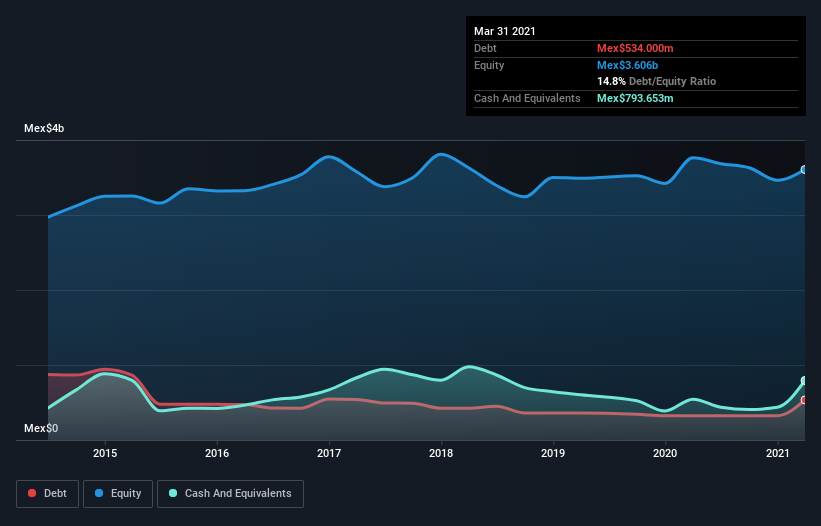David Iben put it well when he said, 'Volatility is not a risk we care about. What we care about is avoiding the permanent loss of capital.' It's only natural to consider a company's balance sheet when you examine how risky it is, since debt is often involved when a business collapses. As with many other companies DINE, S.A.B. de C.V. (BMV:DINEB) makes use of debt. But the real question is whether this debt is making the company risky.
Why Does Debt Bring Risk?
Debt and other liabilities become risky for a business when it cannot easily fulfill those obligations, either with free cash flow or by raising capital at an attractive price. In the worst case scenario, a company can go bankrupt if it cannot pay its creditors. However, a more usual (but still expensive) situation is where a company must dilute shareholders at a cheap share price simply to get debt under control. Of course, the upside of debt is that it often represents cheap capital, especially when it replaces dilution in a company with the ability to reinvest at high rates of return. When we think about a company's use of debt, we first look at cash and debt together.
See our latest analysis for DINE. de
What Is DINE. de's Debt?
The image below, which you can click on for greater detail, shows that at March 2021 DINE. de had debt of Mex$534.0m, up from Mex$324.0m in one year. But on the other hand it also has Mex$793.7m in cash, leading to a Mex$259.7m net cash position.

A Look At DINE. de's Liabilities
The latest balance sheet data shows that DINE. de had liabilities of Mex$962.2m due within a year, and liabilities of Mex$1.55b falling due after that. Offsetting this, it had Mex$793.7m in cash and Mex$124.6m in receivables that were due within 12 months. So its liabilities total Mex$1.59b more than the combination of its cash and short-term receivables.
Of course, DINE. de has a market capitalization of Mex$9.84b, so these liabilities are probably manageable. However, we do think it is worth keeping an eye on its balance sheet strength, as it may change over time. While it does have liabilities worth noting, DINE. de also has more cash than debt, so we're pretty confident it can manage its debt safely. There's no doubt that we learn most about debt from the balance sheet. But it is DINE. de's earnings that will influence how the balance sheet holds up in the future. So when considering debt, it's definitely worth looking at the earnings trend. Click here for an interactive snapshot.
In the last year DINE. de had a loss before interest and tax, and actually shrunk its revenue by 40%, to Mex$894m. That makes us nervous, to say the least.
So How Risky Is DINE. de?
We have no doubt that loss making companies are, in general, riskier than profitable ones. And in the last year DINE. de had an earnings before interest and tax (EBIT) loss, truth be told. And over the same period it saw negative free cash outflow of Mex$7.4m and booked a Mex$37m accounting loss. With only Mex$259.7m on the balance sheet, it would appear that its going to need to raise capital again soon. Summing up, we're a little skeptical of this one, as it seems fairly risky in the absence of free cashflow. There's no doubt that we learn most about debt from the balance sheet. But ultimately, every company can contain risks that exist outside of the balance sheet. To that end, you should be aware of the 1 warning sign we've spotted with DINE. de .
When all is said and done, sometimes its easier to focus on companies that don't even need debt. Readers can access a list of growth stocks with zero net debt 100% free, right now.
If you decide to trade DINE. de, use the lowest-cost* platform that is rated #1 Overall by Barron’s, Interactive Brokers. Trade stocks, options, futures, forex, bonds and funds on 135 markets, all from a single integrated account. Promoted
New: Manage All Your Stock Portfolios in One Place
We've created the ultimate portfolio companion for stock investors, and it's free.
• Connect an unlimited number of Portfolios and see your total in one currency
• Be alerted to new Warning Signs or Risks via email or mobile
• Track the Fair Value of your stocks
This article by Simply Wall St is general in nature. It does not constitute a recommendation to buy or sell any stock, and does not take account of your objectives, or your financial situation. We aim to bring you long-term focused analysis driven by fundamental data. Note that our analysis may not factor in the latest price-sensitive company announcements or qualitative material. Simply Wall St has no position in any stocks mentioned.
*Interactive Brokers Rated Lowest Cost Broker by StockBrokers.com Annual Online Review 2020
Have feedback on this article? Concerned about the content? Get in touch with us directly. Alternatively, email editorial-team (at) simplywallst.com.
About BMV:DINE B
DINE. de
Through its subsidiaries, develops real estate projects in Mexico.
Acceptable track record with mediocre balance sheet.
Market Insights
Community Narratives



